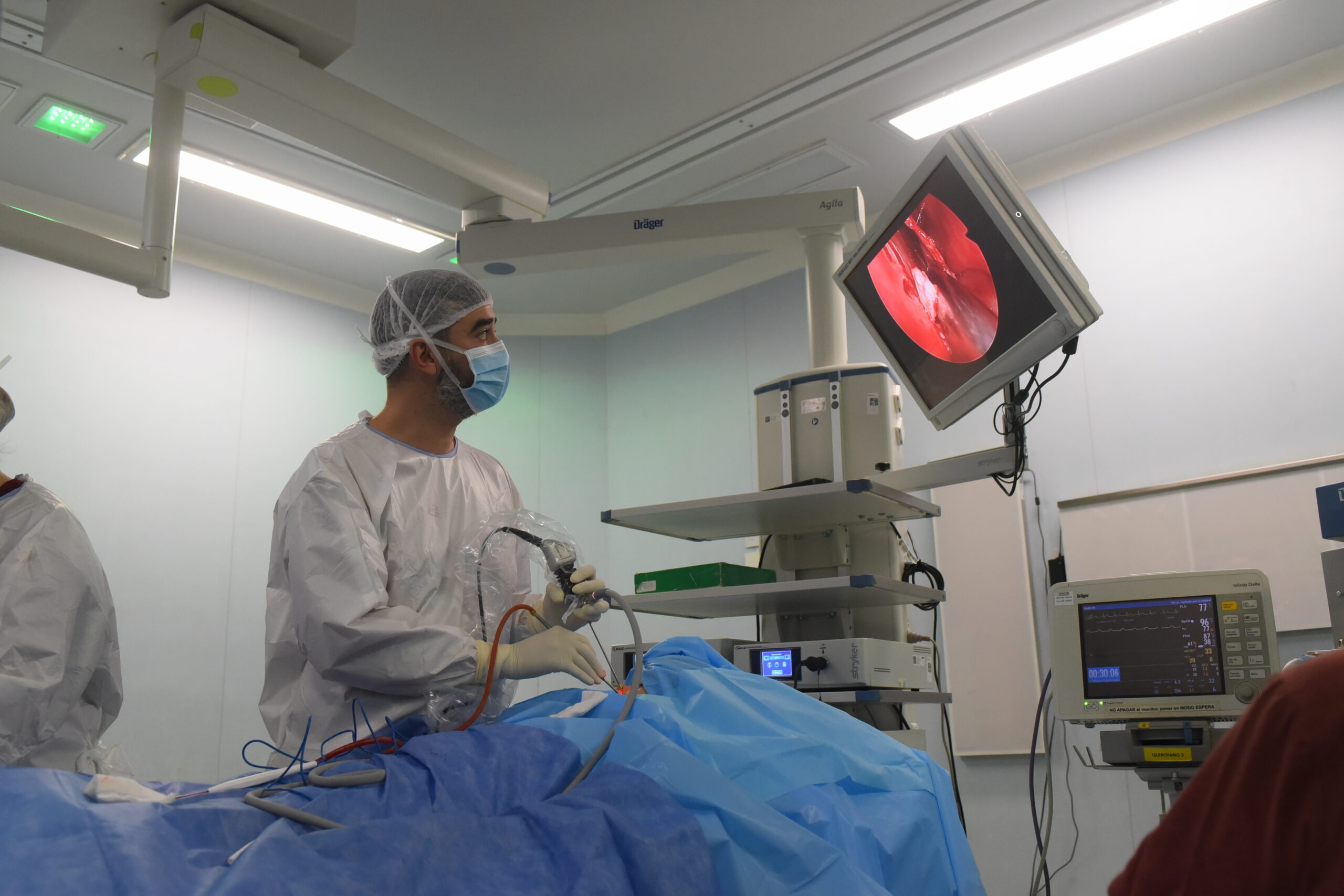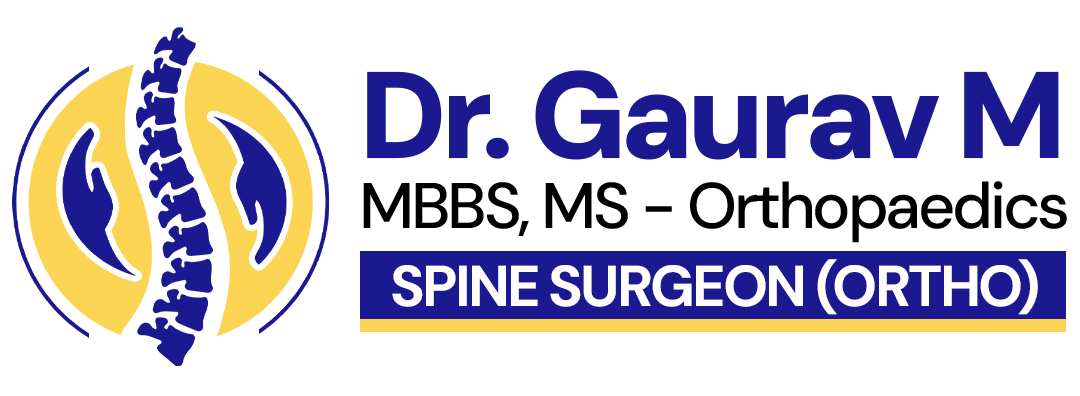Opening Hours
Mon to Sat
6:00 PM – 9:00 PM
Sunday
Closed
Relief Begins with the Right Care
Experience advanced spine and orthopaedic treatment tailored for you.
- Full Endoscopic Interlaminar / Transforaminal Discectomy
- Full Endoscopic Decompression for stenosis
- Full Endoscopic revision Discectomy
- Foraminoplasty
- Minimally invasive fixation for Spinal fractures
- Kyphoplasty and Vertebroplasty
- Anterior Cervical Discectomy and Fusion (ACDF)
- Transforaminal Lumbar Interbody Fusion (TLIF)
- Oblique lumbar interbody Fusion (OLIF)
- Minimally invasive Trans Kambin fusion surgery (OLLIF / KLIF)
- Full Endoscopic Fusion surgery
Full Endoscopic Interlaminar / Transforaminal Discectomy: Advanced, Minimally Invasive Spine Relief

Back pain, sciatica, and leg numbness caused by herniated discs are among the most common spine-related complaints in clinical practice. While conservative management such as physiotherapy, medications, and injections may bring temporary relief, certain patients require surgical intervention to address the root cause. Fortunately, modern spine surgery has evolved to become far less invasive while offering faster and more effective outcomes. One of the most cutting-edge techniques today is Full Endoscopic Discectomy, including both Interlaminar and Transforaminal approaches.
If you are looking for advanced spine solutions, Full Endoscopic Interlaminar in Rajajinagar and Transforaminal Discectomy in Rajajinagar provide minimally invasive options that combine high precision with rapid recovery.
What is Full Endoscopic Discectomy?
Full Endoscopic Discectomy is a minimally invasive spine surgery technique that uses a small tubular system and a high-resolution endoscope to access and remove herniated disc material that compresses spinal nerves. Unlike traditional open surgery, this method requires only a small incision (typically less than 1 cm), sparing muscles and ligaments, reducing blood loss, and minimizing postoperative pain.
There are two primary approaches depending on the location of the disc herniation:
- Interlaminar Approach: Commonly used for central or paracentral disc herniations, especially in the lower lumbar levels like L4-L5 and L5-S1.
- Transforaminal Approach: Used for foraminal and far-lateral disc herniations and allows access from the side, avoiding major back muscles.
Both approaches are highly effective, and the choice depends on the disc’s position, the patient’s anatomy, and the surgeon’s recommendation.
Benefits of Full Endoscopic Interlaminar / Transforaminal Discectomy
Patients undergoing Full Endoscopic Interlaminar in Rajajinagar or Transforaminal Discectomy in Rajajinagar experience several advantages over traditional spine surgeries:
- Minimal Tissue Disruption: Only a small incision is made, and muscle tissue is gently separated instead of cut.
- Local Anesthesia Possible: Many endoscopic discectomies can be performed under local anesthesia with sedation, reducing the risks associated with general anesthesia.
- Faster Recovery Time: Patients often return to light activity within a few days and resume full activity much sooner than after open surgery.
- Outpatient Procedure: Most patients can go home the same day, making it a convenient and cost-effective option.
- Reduced Risk of Complications: Lower risk of infection, scarring, and spinal instability.
- Precise Visualization: High-definition endoscopic equipment allows surgeons to clearly view and treat the pathology with maximum accuracy.
When is This Procedure Recommended?
Not every case of back pain requires surgery. However, endoscopic discectomy may be recommended if:
- You have persistent leg pain (sciatica) that hasn’t improved with conservative treatment for over 6–8 weeks.
- Imaging (MRI or CT scan) confirms a herniated disc compressing a spinal nerve.
- You have neurological symptoms such as numbness, tingling, or weakness.
- There is evidence of worsening function or bladder/bowel control in severe cases.
Both Interlaminar and Transforaminal Discectomy can effectively treat these conditions with excellent clinical outcomes when performed by an experienced spine surgeon.
Surgical Process Overview
- Preoperative Assessment: Includes detailed neurological examination and MRI/CT scans to determine the disc location and plan the approach.
- Anesthesia and Positioning: The patient is positioned prone or lateral depending on the access route, and either local or general anesthesia is administered.
- Endoscopic Access: A small incision (usually less than 1 cm) is made. Through this, a working channel and endoscope are inserted to access the herniated disc.
- Discectomy: Under direct visualization, the surgeon removes the protruded disc material compressing the nerve.
- Closure and Recovery: No stitches are usually needed—just a small bandage. Patients walk a few hours after surgery.
Clinical Expertise and Patient-Centric Care
Success in spine surgery is not just about the technology—it also depends on the experience and precision of the surgeon. Dr. Gaurav M, one of the most reputed and accomplished spinal specialists, has performed hundreds of successful full endoscopic procedures. His patient-first approach, commitment to advanced minimally invasive care, and mastery in both interlaminar and transforaminal techniques make him a trusted name in the field.
Patients treated by Dr. Gaurav M consistently report significant pain relief, minimal post-operative discomfort, and quicker return to normal life, making him a leading choice for those seeking the Best Spine Surgeon in Bangalore.
Recovery and Post-Surgery Care
After surgery, patients are typically able to stand and walk within a few hours. Most are discharged the same day or the next morning. Here are a few post-surgical care guidelines:
- Light activity can be resumed within 2–3 days.
- Avoid heavy lifting, bending, and twisting for at least 2 weeks.
- Physical therapy may be advised to strengthen the spine and prevent recurrence.
- Regular follow-ups are important to monitor healing and function.
Compared to conventional surgeries, the endoscopic technique allows for quicker functional restoration with minimal disruption to daily life.
Conclusion
Whether you’re dealing with persistent sciatica, numbness, or mobility issues due to a herniated disc, Full Endoscopic Interlaminar in Rajajinagar and Transforaminal Discectomy in Rajajinagar offer you state-of-the-art options to treat spinal problems with minimal downtime.
Choosing the right technique and the right surgeon is the key to long-term success. For those seeking excellence in spine care, consulting the Best Spine Surgeon in Bangalore ensures not only expert intervention but also compassionate care and a smoother road to recovery.

